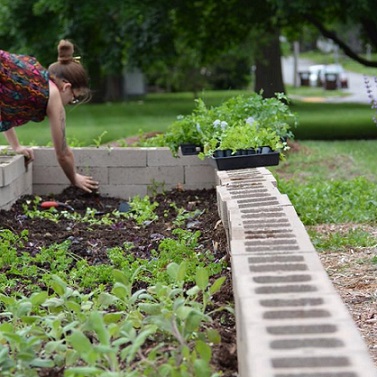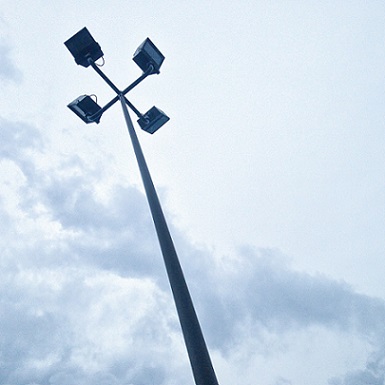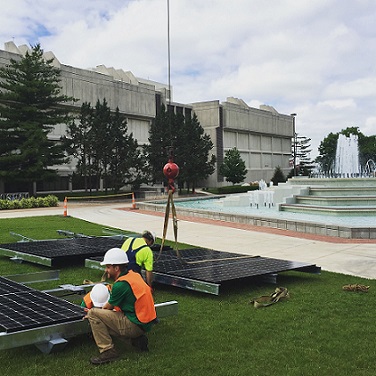Approved Proposals
AASHE STARS
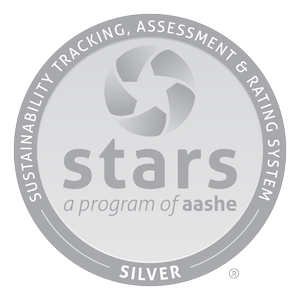
Thanks to this student-initiated proposal, Missouri State University now participates in AASHE (the Association for the Advancement of Sustainability in Higher Education) STARS (Sustainability Tracking Assessment & Rating System). This is a benchmarking tool that allows our university to self-report data on all sectors of our university. STARS has allowed us to identify our strengths and ways we can improve sustainability on campus, which we are using every day to make strides to become a more sustainable university. We received a Bronze rating after our first submission in 2011. We are excited to announce that we achieved a Silver rating as a result of our second submission in April 2015.
Big Urbie
Previously, rain water would gather around the Pinegar Arena at the Darr Agriculture Center and was not utilized in any fashion. This proposal funded the installation of water retention tanks located to the east of the parking lot adjacent to Pinegar Arena. These tanks have the potential to hold up to 20,000 gallons of rainwater. This water is utilized inside Pinegar Arena as part of the dust suppression system already in use inside the arena. This utilization of rain water displaces the domestic water we are currently using for this purpose.
Bike Maintenance Stations
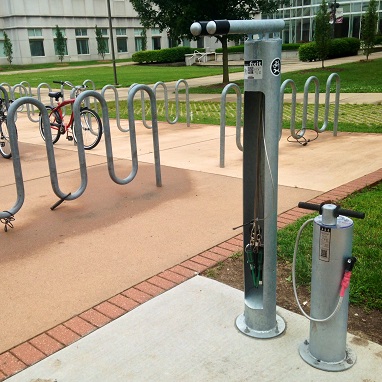
There are now four bike maintenance stations located on campus. The purpose of these bike maintenance stations is to allow students, staff, and faculty on the Missouri State University Springfield campus to easily fix and maintain their bicycles. By adding this convenient feature to our campus, we hope to inspire camaraderie within the bicycling community. These convenient stations provide air pumps, a variety of tools, and hanger arms from which to hang your bike while making adjustments.
You can find these stations in front of Garst and near Foster Recreation Center, Kemper Hall, and Strong Hall.
Bike Racks
Bike Rack for Plaster Center
In 2011, a proposal was passed to install additional bike racks on campus as a way to increase student safety, security, and promote sustainable practices such as bike riding.
Campus Garden Phase I and Campus Garden Phase II
In 2011, some passionate students turned their dream of a Campus Garden into a reality. Since then, this student managed project has served as a source of locally grown produce, education and community building for the campus community. For more information, visit the Campus Garden page.
Electricity-Generating Stationary Bikes in Foster Recreation Center
This proposal was cancelled.
Electric Vehicle
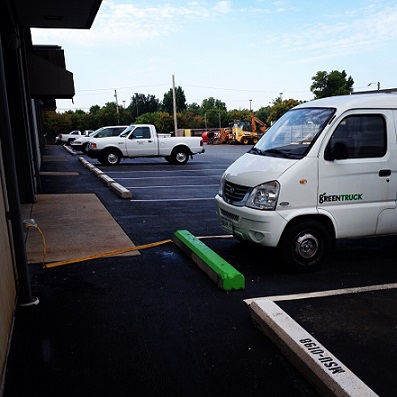
In 2010, we obtained an Electric Vehicle to be used to collect and transport various types of recycling on campus. The e-truck was essential to expanding the campus recycling program to include outdoor recycling bins. It also allows the student recycling workers to pick-up large quantities of cardboard, transport more recyclables in a single trip and to pick-up batteries, ink and toner cartridges and e-waste.
By purchasing this electric vehicle, the campus recycling program has grown significantly and allowed us to strengthen our commitment to environmental sustainability.
Energy Dashboard
Since 2013, MSU has had an Energy Dashboard, which is an online tool used to educate the campus community about building-specific utility consumption, opportunities for energy efficiency improvements, and promote sustainability and environmental awareness. It shows the consumption of electricity, water, natural gas, chilled water, and steam and is updated every 15 minutes.
Glass Recycling in Residence Halls
In 2014, a student initiated a project to get 60 recycling bins in Freudenberger House, Blair-Shannon House, Wells House, Woods House, and Monroe Apartments. These bins allow glass recycling to be possible in the residence halls. Unfortunately, glass is not accepted in the commingled bins you can find outside and in academic buildings.
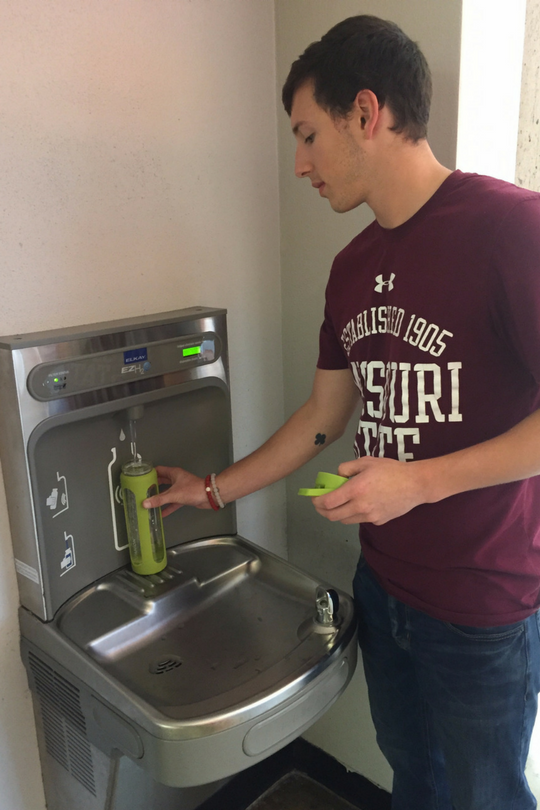 Hydration Station I and Hydration Stations Phase II
Hydration Station I and Hydration Stations Phase II
- PSU Hydration Station
- Strong Hall Hydration Station
- Karls Hall Hydration Station
- Bond Learning Center Hydration Station
- Craig Hall and Plaster Student Union
Thanks to dedicated students, we have filtered water bottle refilling stations at over 60 locations on campus. Choosing to refill a water bottle instead of buying a disposable one is much more environmentally friendly.
As of the summer of 2017, the hydration stations on campus had saved over 2.7 MILLION bottles from being used and going to the landfill!
More information and a list of hydration station locations can be found on the Reduce and Reuse page.
Integrated Waste Management Plan
The project will work to assess current waste, recycling, and waste minimization practices across Missouri State University’s (MSU) Springfield Campus. It is a comprehensive waste study that engages students in the process of evaluating current waste and recycling streams and volumes, determining limitations, infrastructure requirements, identifying improvement opportunities, determining cost effectiveness, and establishing a long-term plan for waste reduction. The finished product will be a written plan of current practices, recommendations, key performance metrics, and cost analysis that will be used to establish ongoing strategic plans and goals. In order to complete the project, MSU will contract with the Illinois Sustainable Technology Center (ISTC) to facilitate the project and perform the Waste Audit and Integrated Waste Management Plan.
Karls Hall Greenhouse Energy Waste Reduction
The rooftop greenhouse of Karl Hall provides Missouri State University students with a hands-on learning experience, an invaluable teaching tool that caters to all disciplines. The proposal addressed the problems with the waste of energy in an inefficient, derelict, and outdated climate system. The major problems in the greenhouse include the shade cloth system, vent drives, evaporative cooling systems, and sensors controlling the integrated climate system.
Low Tunnels
In 2013, a student realized that low tunnels, or covers for plants made from wire and plastic, would give our Campus Garden an extended growing season throughout the year. They provided insulation for leafy green crops in cool weather, and the wire can be used to support shade and insect barrier cloths to protect summer plants from high temperature and harmful insects.
LED Lighting
LED lights make areas more well-lit and safe. They also use significantly less energy than traditional lighting and have lower maintenance costs since they last longer. LED lighting is more environmentally, socially, and economically sustainable than the alternative. We are proud to have LED lighting in so many lots on campus.
LED Pedestrian Lights
This proposal replaced (374) 175 watt Metal Halide pedestrian lights with 45 watt light-emitting diode (LED) lighting. With this conversion, there was be a reduction in energy usage of 74%, annual energy savings of $14,294, and an approximately annual maintenance savings of $34,296.
Notebook Binding Machine
In 2011, a proposal passed to buy a notebook binding machine meant to be used by any student organization for their notebook binding needs, but was mainly meant to be used by the group Students for a Sustainable Future to create notebooks. These notebooks are made of upcycled, salvaged cereal boxes for the covers and reused paper that would have otherwise been recycled or thrown away. These notebooks were sold in the bookstore. Since this allows for upcycling and reusing, which is a better alternative before recycling, this was a very sustainable project. The notebook binding machine is located in the OSE.
Occupancy Sensors in Hutchens House
This proposal funded the installation of 116 Light Occupancy Sensors within Hutchens House Residence Hall, resulting in a reduction of the electricity consumed by the lighting fixtures within Hutchens House common areas. These sensors are projected to decrease the amount of energy consumption by 33% which will save Missouri State University $3,813 per year in energy costs. The estimated simple payback was 29 months after completed installation.
Recycling Bins Outdoors
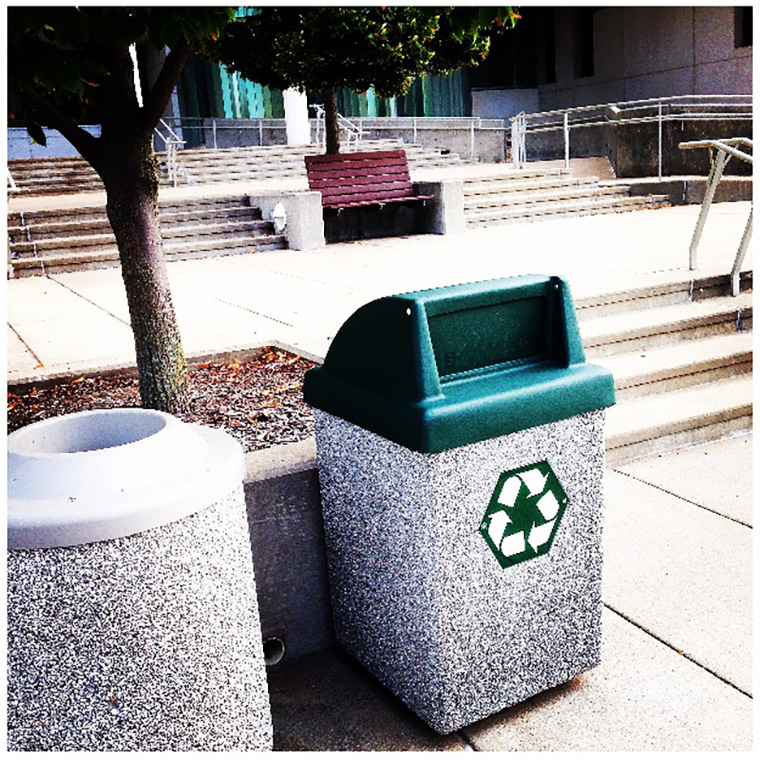
It may be difficult to believe, but before 2012, MSU did not have outdoor recycling bins! Two students saw a need for outdoor recycling bins, and wrote a proposal to get 20 of them placed in various locations across campus. These bins can be easily identified by their green lids and recycling decals. Thanks to this proposal you can now easily recycle most materials using these commingled bins, just please do NOT place glass into these bins. Recycling has increased significantly since these bins were introduced to campus.
For more information on recycling on campus, please visit the Recycling FAQs page.
Recycling in Ellis Hall and Davis-Harrington Welcome Center
Recycling Bins for Events: ClearSteam
25 ClearStream recycling bins were purchased in order to provide additional recycling at BearFest Village during home football games and other campus events as needed.
Recycling Bins Strong Hall
Before 2012, recycling in Strong Hall was a confusing process. There were many different types of recycling bins, or no recycling bins, in different locations. Therefore, two students wrote a proposal to replace these bins so that they look more uniform and are much easier to understand in use. You can now find these gray paper, plastic/aluminum, and trash receptacles in this building. The old recycling bins in Strong Hall were moved to other buildings that did not have recycling bins yet. For more information on the different recycling bins on campus and how to use them, please visit the Recycling FAQs page.
Recycling Workers
Thanks to the Student Sustainability Fund, we are able to employ a few student recycling workers to service the commingled and cardboard recycling bins in the academic buildings as well as all of the outdoor recycling bins on campus. Bins are monitored on a weekly basis.
These students also pick up batteries, ink and toner cartridges, and various other recyclable materials across campus when requests are submitted using our online Recycling Submittal Form. We are very happy to have these student workers who make recycling at Missouri State University possible and successful!
Solar Array
This proposal was cancelled due to a significant cost increase for unexpected, but necessary infrastructure modifications.
Solar Stop
The Solar Stop is a solar energy-generating shelter for the bike racks located on the south side of the library. Its purpose is to provide shelter for bikes from inclement weather such as rain and harsh sunlight, generate solar energy, and serve as an educational tool about solar power for the University community. The electricity produced from the Solar Stop feeds into the university grid to offset our power usage. The Solar Stop will set MSU apart for this sustainability innovation, and will hopefully inspire future sustainability projects on campus.The Solar Stop is currently under construction and will be completed Summer 2015.
Solar Tables

This project proposal purchased two solar powered docking stations (Solar-Dok) as a way to provide a convenient, sustainable method of recharging electronic devices while also educating the campus community on an alternative source of energy. The tables not only produce and store energy, they are also made from recycled materials! The solar tables are a great place to hang out with friends or do your homework while charging your electronics with the power of the sun!
The tables are located between the Foster Recration Center and Blair-Shannon dining hall.
Sustainability Literacy – Northwest Earth Institute (NWEI) Courses
This proposal funded the creation of a Sustainability Literacy Program, which utilizes workbooks created by the Northwest Earth Institute (NWEI) to allow groups of students, faculty, and staff to complete discussion courses on several different topics relating to sustainability. The program encourages students to learn more about sustainability, environmental issues, and social action. Participants can then use their newfound knowledge to advance sustainability efforts at Missouri State. Participants can also use this knowledge into the workplace and in their personal lives. Eighty percent of NWEI past participants felt a greater sense of personal obligation to solving environmental challenges.
Sustainability Workshops
This proposal funded a weekly workshop series that intended to give students both the information and the take-home tools to encourage sustainable lifestyles. The workshops engaged the University community and encouraged recycling, soil and water conservation, waste reduction, and environmentally responsible purchasing.
Water Bottles
The Water Bottle Proposal was one of the very first sustainability proposals ever written. It provided stainless steel water bottles to all residence of Freudenberger, Wells, Woods, Blair-Shannon, Hammons, and Hutchens houses with hopes that students would use these instead of using disposable cups and bottles, thus reducing waste on campus.
Water Conservation in Residence Halls
In 2011, a proposal was passed to provide low-flow showerheads, sink aerators, toilet-leak detecting dye tablets, and 5 minute shower timers to Kentwood Hall, Hammons House, Hutchens House, Woods House, Blair-Shannon House, Freudenberger House, and Wells House. These 4 water-saving initiatives save an estimated millions of gallons per year which saves the university money and, more importantly, conserves water: one of the most precious life-sustaining finite resources on earth.
Zipcar Car-Sharing Service
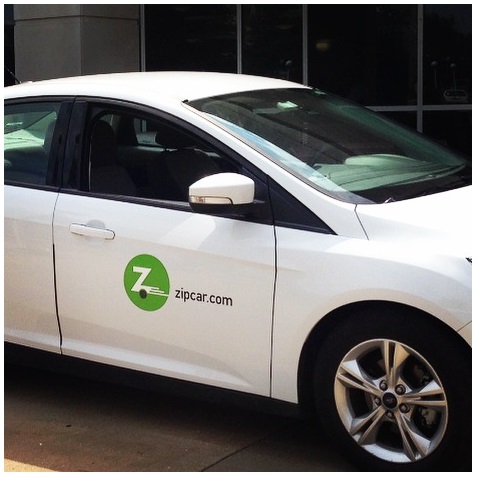
In 2014, we introduced Zipcar, a car sharing service, to Missouri State University! Zipcar provides self-service, on-demand car sharing to our campus.
In order to use Zipcar, you can register as a member, reserve a car online or by phone, and then use your zipcard to enter the car! You can rent by hour or by day. Gas, insurance and maintenance are included for free! When you’re done, return the car to the same location where you picked it up.
The Zipcar program was discontinued in December 2016.
ZipGrow Towers - Hydroponic Grow Room
This proposal funded the installation of ZipGrow hydroponic growing towers in a former storage closet in Kentwood Hall, a downtown residence hall. The room houses three ZipGrow racks with a total of 48 individual towers being used for the production of herbs and greens. Lumigrow Pro 325 LED grow lights were installed in the room to provide photosynthetically active light to the plants. Paid Student Interns, advised by Darr School of Agriculture, are responsible for maintaining the systems. The two interns are funded by Chartwells and work 15-20 hours per week, including through the summer months. The students learn hands-on how to produce food in an alternative way to conventional agriculture.
Period Poverty Project
Pinegar Arena
Bike Share Program
Bear Pantry
Cheek Lighting
Robotic Lawn Mower
Student Engagement and Awareness
Sustainability Intern
Campus Garden Cameras
Period Poverty Project
